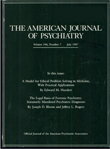Effectiveness of restarting lithium treatment after its discontinuation in bipolar I and bipolar II disorders
Abstract
OBJECTIVE: This study tested the hypothesis that resumption of lithium treatment of bipolar disorders may be less effective after maintenance treatment has been discontinued. METHOD: Eighty-six patients with type I or II bipolar disorder, not selected according to response to treatment, were followed prospectively during two periods of lithium maintenance treatment averaging 4.6 and 4.4 years. Morbidity (illness episodes per year, hospitalizations per year, percentage of time ill) was assessed, and use of adjunctive medication was rated. RESULTS: Morbidity was similar in the first and second treatment periods (mean number of episodes = 0.83 and 0.94 per year, respectively; mean percentage of time ill = 18.0% and 24.2%), with no differences in numbers of manic and depressive episodes or differences by gender, diagnostic type, length of first treatment, interval between treatments, or discontinuation rate. There was 12.8% more use of adjunctive medication in the second period. CONCLUSIONS: The efficacy of lithium did not differ significantly between the first and second treatment periods.



